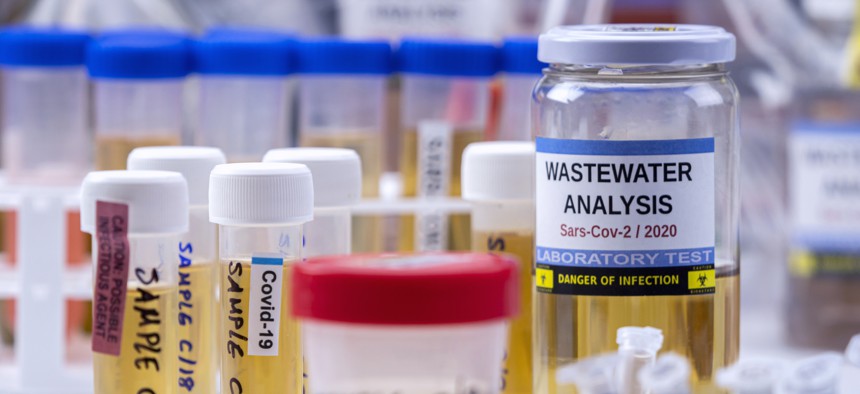Who sees what you flush? Wastewater surveillance for public health is on the rise, but a new survey reveals many US adults are still unaware

DIGICOMPHOTO/SCIENCE PHOTO LIBRARY via Getty Images

Connecting state and local government leaders
A recent study shows that most people are unaware that their home's wastewater could be monitored, but are okay with community-level surveillance.
Flush and forget? Not if you have a toilet that flushes to one of over 3,000 sites around the world where researchers are using wastewater to track SARS-CoV-2, the virus that causes COVID-19.
But what do members of the public actually know about wastewater surveillance? And what do they think about researchers tracking what they send down the drain at their home?
While not new, this form of public health surveillance has gained attention since the early days of the COVID-19 pandemic. Tracking the rise and fall of the level of coronavirus in wastewater provides officials with a snapshot of how much SARS-CoV-2 is circulating in a community. Together with data on case counts, health officials can use this information to guide their local actions – for example, choosing to increase testing or vaccination campaigns. Where available, immunocompromised individuals may also find it useful to access data for their local area via online dashboards as they try to manage their overall exposure risk.
In our recent study, my colleagues and I explored public perceptions of using sewer samples for monitoring community health in the United States. Using an online survey of more than 3,000 adults in the U.S., we were able to gauge respondents’ general boundaries in this expanding field of community monitoring. We didn’t find much consensus, suggesting the need for more public outreach and education.
What happens after you flush
Households connected to sewer lines pay utilities to remove their waste. In the absence of a sewer problem, most people are able to flush and forget.
Sewage typically travels through publicly owned infrastructure to a treatment plant operated by a utility. Researchers and officials currently sample wastewater not just for the coronavirus but also for polio and flu monitoring. Samples are usually collected with permission of the utility, but no one asks the households being sampled if they are willing to participate. Treatment plants conduct other kinds of Environmental Protection Agency-mandated testing, such as looking for pollutants in wastewater.
In our survey, we found that a large portion of the public was unaware that sewage surveillance takes place for public health purposes in many areas. Respondents were more aware of other forms of public health monitoring, such as restaurant inspections and water quality testing.
That about half of respondents didn’t even know sewage monitoring is happening underscores the fact that no one asks individual residents for permission to test an area’s wastewater.
We found more support for monitoring external threats in wastewater, such as diseases, environmental toxins and terrorist threats like anthrax. Fewer people expressed support for tracking lifestyle behaviors, such as smoking or use of birth control, diet, and indicators of mental health, including stress hormones, which are emerging areas of monitoring not yet tracked in many local areas.
Our results suggest that the public may not want unchecked monitoring of their toilet flushes.
When we asked people to consider the various scales at which wastewater surveillance can happen, we found a general theme of “the bigger, the better.” Sampling from a larger area is a way to protect privacy, since one person’s information is mixed in with many others’.
More respondents said they were OK with monitoring an entire city compared with monitoring at the level of individual residences. Notably, more respondents who self-reported living in urban areas endorsed monitoring the entire city than those who self-reported living in suburban areas.
Looking at flushes is not going away
My colleagues and I did not find significant nationwide fear about sewage surveillance among our survey respondents. But those surveyed certainly had opinions that officials may want to consider more deeply when it comes to wastewater tracking.
While wastewater surveillance in urban or suburban areas provides good coverage for an overall picture of COVID-19 in the community, coverage is still not fully inclusive of the entire public. It would not capture data from the approximately 15% of the United States population whose homes do not have a sewer connection. That group includes people who have septic tanks in more rural areas.
How protected is individual privacy? Confirming that SARS-CoV-2 is present in a city is different than confirming it’s present in a neighborhood, and that’s different from confirming it’s present in a dormitory or prison building. Looking at a wider area ensures the sample stays anonymous. At the moment, there are no health privacy protection laws or regulations about sewage surveillance in the U.S. Officials rely on goodwill from utilities to gain access to wastewater and the health information it holds, and often partner with commercial laboratories, such as Biobot.
Wastewater data is immensely valuable. However this public health surveillance tool is used in the future, our survey suggests that there’s room for more education and conversation with the public. After all, they’re the one’s being monitored.
![]()
Rochelle H. Holm, Associate Professor of Medicine, University of Louisville
This article is republished from The Conversation under a Creative Commons license. Read the original article.

NEXT STORY: Algorithm Analyzes Escort Ads to Detect Human Trafficking




